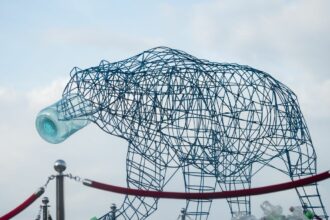“Never give in. Never give in. Never, never, never, never—in nothing, great or small, large or petty—never give in, except to convictions of honour and good sense. Never yield to force. Never yield to the apparently overwhelming might of the enemy.”
? Winston Churchill.
The world is in a great lockdown, facing the worst downturn since the Great Depression. The coronavirus outbreak has evolved into a global pandemic with over 200 countries affected to date. With no vaccine in sight, the virus has caused over 265,000 deaths and 3.8 million people infected.
VUCA – volatile, uncertain, complex and ambiguous, a term coined by the United States War College in 1998 to train officers for the 21st century describes perfectly the world we’re living in. The virus has created utter chaos, disrupting every aspect of our lives. Global economic recovery will be a slow journey.
Some of the challenges moving forward that businesses are facing is – amid mounting uncertainty consumer behaviour and demand patterns has been fundamentally altered. Another is that there is no clarity on the long-term financial state of the economy. How to define the way forward when economic recovery will differ from country to country.
It certainly won’t be business as usual as that is what got us here in the first place. Instead it will be changes that we’ve had to make to adapt and survive that will define our future in this volatile environment. Organisations must be alert, nimble, and agile as they face long lasting demand and supply changes. It’s imperative they understand what customers value, their needs, their fears and their priorities, develop products and experiences based on those insights.
Companies need to reconfigure their business model, develop cohesive overarching strategies. They must build an agile model around clients, suppliers and resources that responds to volatile unpredictable global events, allowing quick decision making devoid of errors or early inaction.
Resilience and Adaptability are essential. Making this turnaround requires strong leadership with a clear and coherent vision, building a resilient cohesive team, as well as investments in innovation & digital transformation. This virus isn’t miraculously going away anytime soon. This isn’t a normal economy, nor is it a normal world, certainly not a normal challenge. To pull us through this VUCA world we need leaders with VUCA:
- Vision, charting a clear path, mission and strategy for the future.
- Understanding of the changing circumstances, seeing the moves as they are happening, not when they are being revealed to the world.
- Courage to step up, to constantly push boundaries, and make tough, bold decisions and moves.
- Adaptability, adapting quickly to changing circumstances without altering strategic courses.
Organisation strategy, market footprint, assets, systems, processes, and its entire supply chain must be re-evaluated to formulate strategic action plans that are sturdy across multiple scenarios. With changing priorities, travel, tourism, retail and luxury purchases will be impacted. In the short term there will be a decrease in consumption and demand for global consumer products, especially for luxury brands.
At this point it’s impossible to define what’s a short-term duration, it can be six months, a year, two years or more. Panic buying, driven by fear and anxiety, on the other hand has led to an increased demand for staple packaged products, home care items and consumer health products. Demand for these may subside sharply post crisis.
During these uncertain times, people’s routine and purchasing habits are reshaped. However, this also creates an opportunity for businesses who can pivot operations and invest in new technologies to adapt to the changing environment.
Businesses need to reprioritise their portfolio based on shifts in consumer and customer needs and a new supply chain. There will be a reconfiguration of the food industry business standards and the way supply chains operate. There may be more government regulations on consumer health and food security, along with more digital traceability to ensure safe production standards. Businesses need to keep their eyes and ears close to the ground, be in tune with the changing regulatory measures.
As consumers desire to remain healthy and safe, businesses may need to focus more on innovative sustainable products and services centred around immunity and safety. The push towards a healthier diet has led to increased sales for plant and cell-based protein manufacturers with more investments and innovation in the industry. Investors are leveraging on the consumer shifts towards sustainable and healthy choices.
The crisis has impacted consumer mobility and retail footfall. As retailers try to cope during the lockdown they are also faced with a new challenge and opportunity of increased e-commerce demand. Globally online retailing has been the major beneficiary of coronavirus impact. The sector has experienced exponential growth since the virus outbreak. There has been a spike in app downloads for e-grocery and food delivery services. For many consumers the challenge with e-grocery is getting used to selecting and ordering a big basket of products. Normally, it will take a long time to adjust to this mode of purchase but forced lockdowns have accelerated that process. The convenience may be too much for some consumers to revert to their old way of shopping, it could even lead to permanent adoption by some.
Digital transformation will change consumer habits and demand. Retailers and supply chains that do not re-position and adapt fast will cease to exist. To be relevant they need to be current with technological advancement in their industries. Regrettably many retailers will be wiped out during this crisis but those with both online and offline presence are capitalising on e-commerce to mitigate the losses from the closure of their physical stores during the lockdown. With online orders for primarily store-based retailers increasing, these businesses will invest more in their e-commerce and digital marketing presence.
Necessity is the mother of Invention. The upsurge of innovation is one of the positive outcomes of this crisis. Automation, immersive new technologies, digital platforms and networks will reshape our world, defining the way we work, live and socialise. Since the lockdown, there’s been an increased telepresence surge in people using cloud platforms and SaaS providers to work from home.
Robot manufacturers have seized the opportunity to showcase their bot’s abilities during this crisis, especially in hospitals or other facilities where patients are quarantined. China, India, Indonesia, Philippines, UAE, Spain have successfully used drones to disinfect public places, controlling the spread of coronavirus. Drones are also used to deliver medical supplies and transport samples from hospitals to laboratories and in the delivery of groceries.
The use of AI and robotics is accelerating. It holds a lot of promises but at the same time challenges as these technologies will replace many work activities currently done by humans. These jobs include receptionist, telemarketers bookkeeping, copy editors, retail sales staff, etc. Fortunately, the transition will not be abrupt, but a gradual process, differing from industry to industry, country to country.
Fret not my fellow humans – people transform organisation, technology is just the tool. Machines and robots can’t replace human intelligence, critical thinking, creativity, empathy and communication. These soft skills are crucial to get through these turbulent times and through this disruption.
Nonetheless, digital solutions need to be developed quickly, and organisations and stakeholders must get out of their comfort zone, reskill and upskill, adapt to new operating models to ensure their businesses remain relevant. Digitisation and automation need to be accelerated in areas of supply chain, back-office functions, procurement, and route to market. All of this will have a major impact on earnings.
Because China is a major producer for various products, as well as a supplier of components and raw materials for multiple industries, when it went into a lockdown some five million companies globally were affected. This coupled with the US-China trade war has made companies and governments realise how overly dependent and vulnerable they were. Supply chain managers had traditionally focused on cost, quality and delivery. There is nothing wrong with doing so. However equally important now is paying attention to resilience, reconfigurability, and responsiveness.
Moving forward, businesses need to conduct a rigorous review of their supply chain, map it out – 1st, 2nd, 3rd tier, supplier’s own source, logistics, etc. They must switch from an operational supply chain to building a resilient supply chain that is smart and flexible, reconfiguring their supply chain exposure, and planning for diversification. This may mean working less with traditional suppliers, a diminished negotiating power, increased shipping cost, etc. Unfortunately, in the short term this cost may be passed on to consumers in the form of higher prices but in the long run everyone benefits.
Organisations need to analyse consumer demands in real time and deliver solutions. To win back client’s, marketers must leverage analytics to design online marketing campaigns and communication channels that are immersive, engaging and social. Big data analyses are increasingly being used in decision making in the various sectors. Sales channels will be more digitalised, pricing, marketing and promotions adjusted based on data.
Life streaming will grow bigger and faster. A wide range of products are sold via this platform, from food, clothes, daily necessities to houses, cars and cosmetics to electronic devices, pets, construction services and events. It has helped retailers broaden their sales channel. There will also be increased advertising spending via streaming and a decrease in outdoor ad spending.
Many of our assumptions of in-person services with physical locations have been challenged during this pandemic. Digital medical tools are showing their usefulness to patients and medical practitioners in this pandemic. Instead of booking an appointment with a doctor, patients now have multiple options at their disposal whether it’s to get advice via a chatbot or to message a nurse or doctor, and getting medication delivered to them. Health care and delivery start-ups in Asia, are raising millions of dollars to accelerate their expansion, e.g Singapore based telemedicine app Doctor Anywhere raised $27 million in late March in a series B funding.
Investors are pouring money into coronavirus resistant businesses. From remote working, video conference calls, e-learning for children, telemedicine, esports, to sales and workouts via streaming, food and alcohol delivery, lots of things have changed and post-pandemic some of these habits are likely to stay. Organisations grappling with integrating technology in their business need to adapt to the modern age. The future is now, not six months or a year or two away. The possibilities are infinite.
Will this be a prolonged recession, or are we entering a depression? Will there be a second wave of the virus hitting our shores in fall? The unknowns are many. You can’t prevent surprises, but you can anticipate them. Nothing is permanent, the only constant is change.
The coronavirus crushed us fast. As countries slowly lift their lockdowns, the recovery will be slow as no one knows how this crisis will play out. But for sure consumer shopping habits will change, and businesses need to adapt.

















